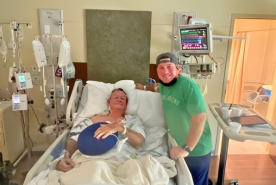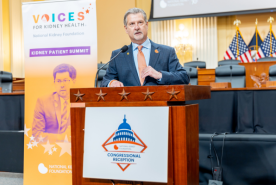September 24, 2020
By Amber Pettis, kidney transplant recipient and NKF Kidney Advocacy Committee member
I recently had the honor of attending roundtable hosted by Center for Medicare and Medicaid Services (CMS) administrator, Seema Verma and HCA Healthcare. I was glad to offer my perspective as an End Stage Renal Disease (ESRD) patient to our discussion on kidney care policies and payment models that will create financial incentives for dialysis facilities, nephrologists, and other healthcare providers to improve how they manage chronic kidney disease (CKD) and ESRD in Medicare patients. The end goal of these policies is to achieve higher rates of home dialysis and transplantation.
A representative from the CMS Center for Medicare and Medicaid Innovation kicked things off, then Administrator Verma gave brief remarks. Both the professionals and patients participating in the conversation agreed that more work is called for to address the education and empowerment barriers around home dialysis follow incentives. Such incentives are a great way to incentivize home dialysis for patients and providers alike and ensure that access to it continues to grow.
As an ESRD patient, I’ve experienced several treatment options including in-center hemodialysis, peritoneal dialysis, and transplantation. Transplantation saved my life and dialysis care was the bridge to that new life. While transplantation was the treatment option that worked best for me, it is important to recognize that there is not a “one size fits all” solution when it comes to kidney care.
It is critical that ESRD patients have access to all treatment options and are provided the necessary education to make an informed decision about their care. These policies allow greater access to all treatment options and can lead to a better quality of life for those living with ESRD.
CKD patients around the nation depend on advancements in kidney care policies to sustain life. I am most grateful for the work being done around the policies and treatment options that improve the quality of life of the thousands of individuals, and their families, living with CKD.


















